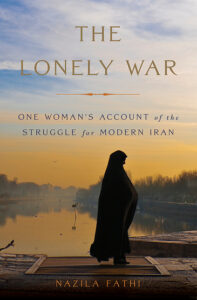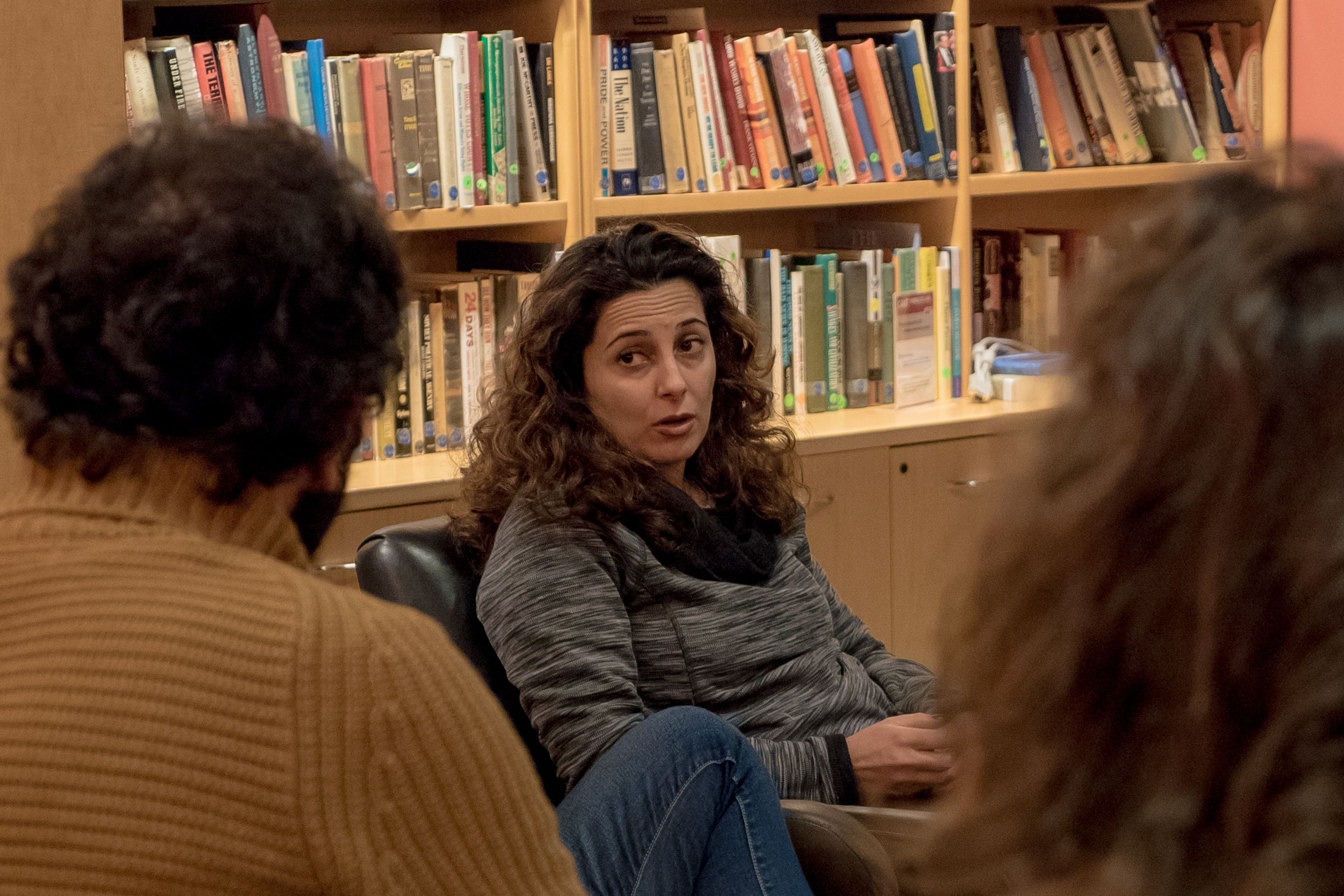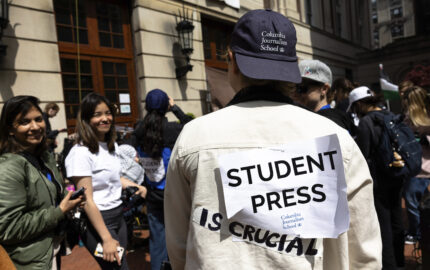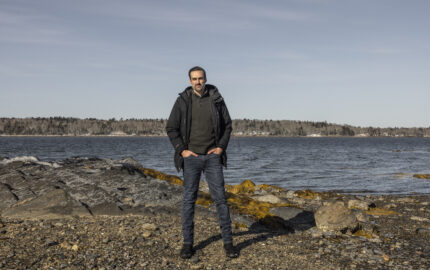Iranian journalist Nazila Fathi was a correspondent for The New York Times at the time of the uprisings in Tehran in 2009. Fearing her life was in danger, she hurriedly left Iran with her husband and two children, assuming they would return when things quieted down. She has not been back since.
It wasn’t the first time that her life had undergone an upheaval due to political forces. She had been 9 years old when a radical Islamic regime threw the shah out of power during the revolution in 1979. Her father, who had been a government official, was sent to work on a farm hundreds of miles from home.
 The author of the recently published “The Lonely War: One Woman’s Account of the Struggle for Modern Iran,” Fathi spoke at the Nieman Foundation on January 12, just a few days before news broke that a Washington Post reporter who has been detained in Iran since July was being indicted. A 2011 Nieman Fellow who now lives near Washington, D.C., Fathi talked about her book, the future of Iran, and the conservative Revolutionary Guard now in power. “The president is a moderate, but the conservatives control all the other leverages. I think that's why the nuclear talks have failed so far,” she said. “I'm not optimistic. I don't see anything coming out of these talks, because the conservatives don't want an agreement. They have the upper hand in Iran in politics.
The author of the recently published “The Lonely War: One Woman’s Account of the Struggle for Modern Iran,” Fathi spoke at the Nieman Foundation on January 12, just a few days before news broke that a Washington Post reporter who has been detained in Iran since July was being indicted. A 2011 Nieman Fellow who now lives near Washington, D.C., Fathi talked about her book, the future of Iran, and the conservative Revolutionary Guard now in power. “The president is a moderate, but the conservatives control all the other leverages. I think that's why the nuclear talks have failed so far,” she said. “I'm not optimistic. I don't see anything coming out of these talks, because the conservatives don't want an agreement. They have the upper hand in Iran in politics.
“It's very obvious that [the conservatives] are constantly competing for control. Every time they feel like they're being alienated they undermine the talks, or they arrest Jason Rezaian to embarrass the government, to use him as a bargaining chip.”
Farnaz Fassihi, a 2015 Nieman Fellow who is senior Middle East correspondent for The Wall Street Journal, moderated the discussion with Fathi. The two have been friends since they met in college. Edited excerpts of their conversation:
What inspired you to write “The Lonely War”?
I gave many talks after I came to the U.S. on a Nieman fellowship about my life and career and there was so much interest. There also were a lot of misperceptions about not only Iran, but about Iranian people, and about society in general. I thought, I have a story to tell here and through my story, I could tell the story of the country.
I tried in my book to show how the country has evolved because people, especially here in the U.S., still remember the Iran of 1979. They still remember the hostage taking, the clerics, the chants of "death to America," and women in the black head-to-toe chador. I didn't want to have a picture of a woman in a chador on the cover. I thought it was a beautiful picture, but I wanted to have a woman with tons of hair, because that's the Iran that I know. I wanted to have a real, normal person on the cover, but nobody sees Iran as normal. Nobody knows there are people with very, very normal desires in that country. I try to tell that story.
What was the most challenging aspect of being a reporter based in Iran for an American paper?
It was good when I started working [in early 2000]. People, including officials, respected you. If I called a senior official and asked for an interview and a local reporter made the same request, I was the one who was going to get the interview. They didn’t care whether you were a woman or a man as the reporter.
I think we had a little bit more protection than local reporters working for local publications. They lost their jobs. They easily got put into prison. But the government treated people like Farnaz and I, dual citizens who worked for Western publications, like bargaining chips. They wouldn't come after us. They'd use us as leverage. If they did come after us, that was dangerous, like what they did to Jason Rezaian, The Washington Post reporter. [After being detained on July 22 and held since then, the reporter was indicted on January 14.] God knows what they want out of his arrest because he wasn't writing a lot.
What were some of the invisible red lines that you knew you couldn't cross as a journalist?
They could be as minor as a slogan that had been chanted at one of the protests like "death to dictator," because everybody knows "death to dictator" is a reference to the Supreme Leader.
What else? Religious minorities, whether it's the Baha'i, which is a faith the regime has denounced since 1979, or it's about the rights of the Sunnis and the Arabs. Religious minorities are a very sensitive topic. Human rights violations are a bit tricky, but it's not impossible to cover it. We covered it. It's just you have to learn how to do it.
Reporting on stories that don't have a government source, that's another dangerous area. You have to make sure that you have a reliable source, who is willing to stand up and back you up later on.
I was summoned and interrogated. But sometimes they didn't call me for a long period of time. After my nanny started spying on me, I wasn't called in at all. The guy who was my sort of handler said goodbye to me. He asked for forgiveness, and I was terrified. I thought, "Oh my God, he's abandoning me."
I knew he was from the Ministry of Intelligence. I knew he had some kind of position and so he couldn't do anything that was outrageous. People had been killed. Being in touch with him gave me some kind of protection. When he abandoned me, I was terrified.
Because my nanny had started spying on me for the Revolutionary Guard, the Guard had pushed the intelligence ministry out of the picture. You don't want to deal with the Revolutionary Guard. They are quite cruel.
You left Iran amid the 2009 protests. Can you describe what it was like being a journalist at that time?
The protests broke out on June 12th [2009]. A few days later the government faxed us a letter saying that resident journalists were not allowed to go out and cover the protests and it said that if anything happened the ministry was not responsible for our safety. Then they told reporters who had been [in Iran] on visas that they had to leave the country immediately. [That left] just us, dual nationals.
The protests were as big as the 1979 revolution. Everybody thought something was going to come out of it. There had been times in the past when I had felt there was some kind of danger or threat, and I had laid low and not worked, but this was different. This was the biggest story of my life, the biggest story of the country.
We all worked. Then I met this guy, a Revolutionary Guard commander who was also a cleric. He was at the protest leading the militia forces against the protesters. I went and visited him at his office and interviewed him. I knew he was a senior person. He called me one day and warned that it was dangerous for me to cover the protests. He said they had given my photo to snipers to shoot me.
I thought he was intimidating me and so didn't take it seriously at all. I thought he was trying to scare me.
Millions of people were coming out every day [to march]. It was an emotional time and I couldn’t think of myself.
Then within a week one of our colleagues got arrested. He [Maziar Bahari] got arrested a day after he had visited me at my home. He was like the last person on Earth we thought would get arrested.
What about the situation in Iran now? What would it take for a social movement to really take hold and effect change?
The social movement is there. If you're thinking about the kind of change that happened in Egypt, the kind of social movement that became politicized and overthrew the regime, I don't think that's going to happen in Iran. No, Iranians have had a revolution. The majority of the population are our age or younger. We've seen the revolution. We've seen the instability. Those who haven't seen it, those who are younger, they've had parents who have died in the revolution. They've had parents who have died in the war. The fear of any kind of institutional breakdown is very strong in Iran.
It wasn’t the first time that her life had undergone an upheaval due to political forces. She had been 9 years old when a radical Islamic regime threw the shah out of power during the revolution in 1979. Her father, who had been a government official, was sent to work on a farm hundreds of miles from home.
 The author of the recently published “The Lonely War: One Woman’s Account of the Struggle for Modern Iran,” Fathi spoke at the Nieman Foundation on January 12, just a few days before news broke that a Washington Post reporter who has been detained in Iran since July was being indicted. A 2011 Nieman Fellow who now lives near Washington, D.C., Fathi talked about her book, the future of Iran, and the conservative Revolutionary Guard now in power. “The president is a moderate, but the conservatives control all the other leverages. I think that's why the nuclear talks have failed so far,” she said. “I'm not optimistic. I don't see anything coming out of these talks, because the conservatives don't want an agreement. They have the upper hand in Iran in politics.
The author of the recently published “The Lonely War: One Woman’s Account of the Struggle for Modern Iran,” Fathi spoke at the Nieman Foundation on January 12, just a few days before news broke that a Washington Post reporter who has been detained in Iran since July was being indicted. A 2011 Nieman Fellow who now lives near Washington, D.C., Fathi talked about her book, the future of Iran, and the conservative Revolutionary Guard now in power. “The president is a moderate, but the conservatives control all the other leverages. I think that's why the nuclear talks have failed so far,” she said. “I'm not optimistic. I don't see anything coming out of these talks, because the conservatives don't want an agreement. They have the upper hand in Iran in politics.“It's very obvious that [the conservatives] are constantly competing for control. Every time they feel like they're being alienated they undermine the talks, or they arrest Jason Rezaian to embarrass the government, to use him as a bargaining chip.”
Farnaz Fassihi, a 2015 Nieman Fellow who is senior Middle East correspondent for The Wall Street Journal, moderated the discussion with Fathi. The two have been friends since they met in college. Edited excerpts of their conversation:
What inspired you to write “The Lonely War”?
I gave many talks after I came to the U.S. on a Nieman fellowship about my life and career and there was so much interest. There also were a lot of misperceptions about not only Iran, but about Iranian people, and about society in general. I thought, I have a story to tell here and through my story, I could tell the story of the country.
I tried in my book to show how the country has evolved because people, especially here in the U.S., still remember the Iran of 1979. They still remember the hostage taking, the clerics, the chants of "death to America," and women in the black head-to-toe chador. I didn't want to have a picture of a woman in a chador on the cover. I thought it was a beautiful picture, but I wanted to have a woman with tons of hair, because that's the Iran that I know. I wanted to have a real, normal person on the cover, but nobody sees Iran as normal. Nobody knows there are people with very, very normal desires in that country. I try to tell that story.
What was the most challenging aspect of being a reporter based in Iran for an American paper?
It was good when I started working [in early 2000]. People, including officials, respected you. If I called a senior official and asked for an interview and a local reporter made the same request, I was the one who was going to get the interview. They didn’t care whether you were a woman or a man as the reporter.
I think we had a little bit more protection than local reporters working for local publications. They lost their jobs. They easily got put into prison. But the government treated people like Farnaz and I, dual citizens who worked for Western publications, like bargaining chips. They wouldn't come after us. They'd use us as leverage. If they did come after us, that was dangerous, like what they did to Jason Rezaian, The Washington Post reporter. [After being detained on July 22 and held since then, the reporter was indicted on January 14.] God knows what they want out of his arrest because he wasn't writing a lot.
What were some of the invisible red lines that you knew you couldn't cross as a journalist?
They could be as minor as a slogan that had been chanted at one of the protests like "death to dictator," because everybody knows "death to dictator" is a reference to the Supreme Leader.
What else? Religious minorities, whether it's the Baha'i, which is a faith the regime has denounced since 1979, or it's about the rights of the Sunnis and the Arabs. Religious minorities are a very sensitive topic. Human rights violations are a bit tricky, but it's not impossible to cover it. We covered it. It's just you have to learn how to do it.
Reporting on stories that don't have a government source, that's another dangerous area. You have to make sure that you have a reliable source, who is willing to stand up and back you up later on.
I was summoned and interrogated. But sometimes they didn't call me for a long period of time. After my nanny started spying on me, I wasn't called in at all. The guy who was my sort of handler said goodbye to me. He asked for forgiveness, and I was terrified. I thought, "Oh my God, he's abandoning me."
I knew he was from the Ministry of Intelligence. I knew he had some kind of position and so he couldn't do anything that was outrageous. People had been killed. Being in touch with him gave me some kind of protection. When he abandoned me, I was terrified.
Because my nanny had started spying on me for the Revolutionary Guard, the Guard had pushed the intelligence ministry out of the picture. You don't want to deal with the Revolutionary Guard. They are quite cruel.
You left Iran amid the 2009 protests. Can you describe what it was like being a journalist at that time?
The protests broke out on June 12th [2009]. A few days later the government faxed us a letter saying that resident journalists were not allowed to go out and cover the protests and it said that if anything happened the ministry was not responsible for our safety. Then they told reporters who had been [in Iran] on visas that they had to leave the country immediately. [That left] just us, dual nationals.
The protests were as big as the 1979 revolution. Everybody thought something was going to come out of it. There had been times in the past when I had felt there was some kind of danger or threat, and I had laid low and not worked, but this was different. This was the biggest story of my life, the biggest story of the country.
We all worked. Then I met this guy, a Revolutionary Guard commander who was also a cleric. He was at the protest leading the militia forces against the protesters. I went and visited him at his office and interviewed him. I knew he was a senior person. He called me one day and warned that it was dangerous for me to cover the protests. He said they had given my photo to snipers to shoot me.
I thought he was intimidating me and so didn't take it seriously at all. I thought he was trying to scare me.
Millions of people were coming out every day [to march]. It was an emotional time and I couldn’t think of myself.
Then within a week one of our colleagues got arrested. He [Maziar Bahari] got arrested a day after he had visited me at my home. He was like the last person on Earth we thought would get arrested.
What about the situation in Iran now? What would it take for a social movement to really take hold and effect change?
The social movement is there. If you're thinking about the kind of change that happened in Egypt, the kind of social movement that became politicized and overthrew the regime, I don't think that's going to happen in Iran. No, Iranians have had a revolution. The majority of the population are our age or younger. We've seen the revolution. We've seen the instability. Those who haven't seen it, those who are younger, they've had parents who have died in the revolution. They've had parents who have died in the war. The fear of any kind of institutional breakdown is very strong in Iran.



